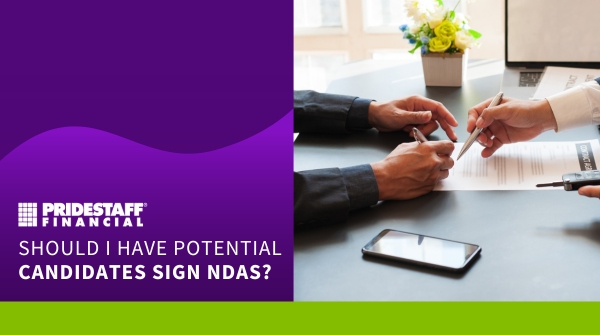Should I Have Potential Job Candidates Sign NDAs?

Hiring can be intimidating; it may also feel challenging to find trustworthy job candidates. Many companies in the finance and accounting industry are concerned with issues of employee theft, employee fraud, employee IP theft, client information theft, and so on. Using NDAs (non-disclosure agreements) may be the right choice for certain organizations that want to keep their information proprietary.
What is an NDA?
A non-disclosure agreement (NDA), or confidentiality agreement, is a legal contract. In an NDA, one party agrees to share confidential information about the business with the second party. The latter, on the other hand, agree not to share the information with anyone else for a specified time period or permanently. The objective of NDAs is to protect sensitive information, intellectual property (IP), and trade secret information from being exposed to competitors or stolen. With NDAs, releasing sensitive information about business or plans to any third party becomes legally forbidden. The parties involved in an NDA could be employers and employees/contractors or two companies.
What types of NDAs are there?
The first is a unilateral NDA. Unilateral NDAs are, as the name suggests, one way. Here, only one party discloses its confidential information to another party that they want to safeguard. When organizations need to share sensitive information with their employees, contractors, clients, or stakeholders and want them not to disclose that information to anyone else, these NDAs are signed. For this reason, it is the most common type of NDA and one many companies typically rely on.
The second type of NDA is a mutual NDA. Also known as a bilateral NDA. In it, both parties exchange private business information with each other, and there is a limitation on how the other party will use and share the information. Mutual NDAs are usually seen during mergers and acquisitions, corporate takeovers, and joint ventures, or client-privileged information.
NDAs for new hires:
When you hire someone as your employee, you give them access to a range of confidential and proprietary data. To safeguard that information, employers have started making new hires sign an NDA to stop them from sharing sensitive data in the present and future. An employee trying to leave the company might share sensitive information during a job interview. So, you need to prohibit sharing with prospective employees through an NDA.
Benefits of an NDA:
There are several benefits of having new hires sign an NDA. First, it clearly defines confidential information and how far that confidentiality extends. Second, it boosts confidence to allow you to share said confidential information and data. Third, it will attract more clients and allow other employees to feel secure. Fourth, it acts like a legal document. Lastly, it ensures compliance and establishes trust. Ultimately, it’s up to you and your company to determine if NDAs are necessary. If there are patterns of behavior or past issues with confidential information being taken or publicly shared with others, then this might be a good way for you to regain confidence in the people you bring on board.



